formerly eScholarship Editions


|
|
|
|
Your request for similar items found 20 book(s). | Modify Search | Displaying 1 - 20 of 20 book(s) | |
| 1. | 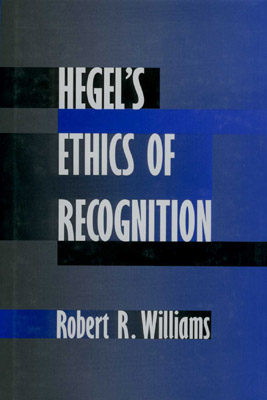 | Title: Hegel's ethics of recognition Author: Williams, Robert R 1939- Published: University of California Press, 1998 Subjects: Philosophy | Ethics Publisher's Description: In this significant contribution to Hegel scholarship, Robert Williams develops the most comprehensive account to date of Hegel's concept of recognition ( Anerkennung ). Fichte introduced the concept of recognition as a presupposition of both Rousseau's social contract and Kant's ethics. Williams shows that Hegel appropriated the concept of recognition as the general pattern of his concept of ethical life, breaking with natural law theory yet incorporating the Aristotelian view that rights and virtues are possible only within a certain kind of community.He explores Hegel's intersubjective concept of spirit ( Geist ) as the product of affirmative mutual recognition and his conception of recognition as the right to have rights. Examining Hegel's Jena manuscripts, his Philosophy of Right , the Phenomenology of Spirit , and other works, Williams shows how the concept of recognition shapes and illumines Hegel's understandings of crime and punishment, morality, the family, the state, sovereignty, international relations, and war. A concluding chapter on the reception and reworking of the concept of recognition by contemporary thinkers including Derrida, Levinas, and Deleuze demonstrates Hegel's continuing centrality to the philosophical concerns of our age. [brief] Similar Items |
| 2. |  | Title: Insight and solidarity: a study in the discourse ethics of Jürgen Habermas Author: Rehg, William Published: University of California Press, 1997 Subjects: Philosophy | Law | Politics Publisher's Description: Discourse ethics represents an exciting new development in neo-Kantian moral theory. William Rehg offers an insightful introduction to its complex theorization by its major proponent, Jürgen Habermas, and demonstrates how discourse ethics allows one to overcome the principal criticisms that have been leveled against neo-Kantianism.Addressing both "commun-itarian" critics who argue that universalist conceptions of justice sever moral deliberation from community traditions, and feminist advocates of the "ethics of care" who stress the moral significance of caring for other individuals, Rehg shows that discourse ethics combines impartiality with solidarity. He provides the first systematic reconstruction of Habermas's theory and explores its relationship to the work of such contemporary philosophers as Charles Taylor. His book articulates a bold alternative to the split between the "right" and the "good" in moral theory and will greatly interest philosophers, social and legal scholars, and political theorists. [brief] Similar Items |
| 3. | 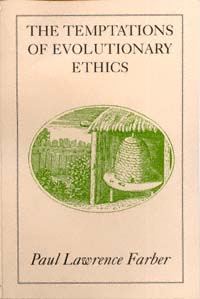 | Title: The temptations of evolutionary ethics Author: Farber, Paul Lawrence 1944- Published: University of California Press, 1994 Subjects: Philosophy | History | Ethics | History and Philosophy of Science Publisher's Description: Evolutionary theory tells us about our biological past; can it also guide us to a moral future? Paul Farber's compelling book describes a century-old philosophical hope held by many biologists, anthropologists, psychologists, and social thinkers: that universal ethical and social imperatives are built into human nature and can be discovered through knowledge of evolutionary theory.Farber describes three upsurges of enthusiasm for evolutionary ethics. The first came in the early years of mid-nineteenth century evolutionary theories; the second in the 1920s and '30s, in the years after the cultural catastrophe of World War I; and the third arrived with the recent grand claims of sociobiology to offer a sound biological basis for a theory of human culture.Unlike many who have written on evolutionary ethics, Farber considers the responses made by philosophers over the years. He maintains that their devastating criticisms have been forgotten - thus the history of evolutionary ethics is essentially one of oft-repeated philosophical mistakes.Historians, scientists, social scientists, and anyone concerned about the elusive basis of selflessness, altruism, and morality will welcome Farber's enlightening book. [brief] Similar Items |
| 4. |  | Title: Earth's insights: a survey of ecological ethics from the Mediterranean basin to the Australian outback Author: Callicott, J. Baird Published: University of California Press, 1997 Subjects: Philosophy | Anthropology | Ethics | Ecology Publisher's Description: The environmental crisis is global in scope, yet contemporary environmental ethics is centered predominantly in Western philosophy and religion. Earth's Insights widens the scope of environmental ethics to include the ecological teachings embedded in non-Western worldviews. J. Baird Callicott ranges broadly, exploring the sacred texts of Islam, Hinduism, Jainism, Taoism, Confucianism, and Zen Buddhism, as well as the oral traditions of Polynesia, North and South America, and Australia. He also documents the attempts of various peoples to put their environmental ethics into practice. Finally, he wrestles with a question of vital importance to all people sharing the fate of this small planet: How can the world's many and diverse environmental philosophies be brought together in a complementary and consistent whole? [brief] Similar Items |
| 5. | 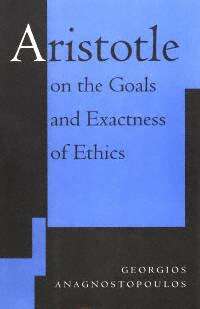 | Title: Aristotle on the goals and exactness of ethics Author: Anagnostopoulos, Georgios Published: University of California Press, 1994 Subjects: Philosophy | Classical Philosophy Publisher's Description: Philosophers as diverse as Socrates, Plato, Spinoza, and Rawls have sometimes argued that ethics can be an exact discipline whose propositions can match the exactness we associate with mathematics. Yet for Aristotle, knowledge of ethical matters is essentially inexact, and his perceptive criticisms of the Socratic-Platonic ideal of ethical knowledge and its metaphysical presuppositions remain of enduring interest to contemporary moral theorists.Georgios Anagnostopoulos offers the most systematic and comprehensive critical examination to date of Aristotle's views on the exactness of ethics. Combining rigorous philosophical argument and close analysis of the philosopher's treatises on human conduct, he gives form to Aristotle's belief that knowledge of matters of conduct, not unlike knowledge of most natural phenomena, can never be free of certain kinds of inexactness. He concludes that according to Aristotle, ethics constitutes a mode of knowledge that is neither totally nondemonstrative on account of its inexactness nor free of the important epistemological difficulties common to all nonmathematical disciplines. [brief] Similar Items |
| 6. | 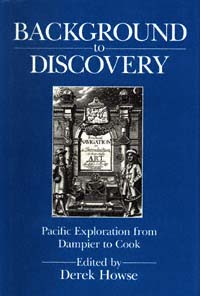 | Title: Background to discovery: Pacific exploration from Dampier to Cook Author: Howse, Derek Published: University of California Press, 1990 Subjects: History | European History | Travel | Geography Publisher's Description: Background to Discovery recounts the great voyages of discovery, from Dampier to Cook, that excited such fervent political and popular interest in eighteenth-century Europe. Perhaps this book's greatest strength lies in its remarkable synthesis of both the achievements of European maritime exploration and the political, economic, and scientific motives behind it. Writing essays on the literary and artistic response to the voyages as well, the contributors collectively provide a rich source for historians, geographers, and anyone interested in the history of voyage and travel. [brief] Similar Items |
| 7. | 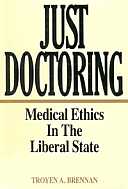 | Title: Just doctoring: medical ethics in the liberal state Author: Brennan, Troyen A Published: University of California Press, 1991 Subjects: Philosophy | Ethics | Medicine Publisher's Description: Just Doctoring draws the doctor-patient relationship out of the consulting room and into the middle of the legal and political arenas where it more and more frequently appears. Traditionally, medical ethics has focused on the isolated relationship of physician to patient in a setting that has left the physician virtually untouched by market constraints or government regulation. Arguing that changes in health care institutions and legal attention to patient rights have made conventional approaches obsolete, Troyen Brennan points the way to a new, more aware and engaged medical ethics.The medical profession is no longer isolated, even theoretically, from the liberal, market-dominated state. Old ideas of physician beneficence and altruism must make way for a justice-based medical ethics, assuming a relationship between equals more compatible with liberal political philosophy. Brennan offers clinical examples of many of today's most challenging medical problems - from informed consent to care rationing and the repercussions of the HIV epidemic - and gives his recommendation for a new ethical perspective. This lively and controversial plea for a rethinking of medical ethics goes right to the heart of medical care at the end of the twentieth century. [brief] Similar Items |
| 8. | 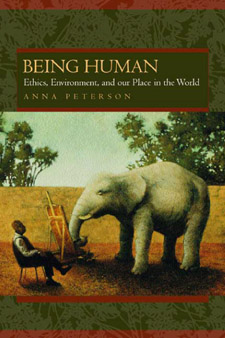 | Title: Being human: ethics, environment, and our place in the world Author: Peterson, Anna Lisa 1963- Published: University of California Press, 2001 Subjects: Religion | Folklore and Mythology | Environmental Studies | Philosophy Publisher's Description: Being Human examines the complex connections among conceptions of human nature, attitudes toward non-human nature, and ethics. Anna Peterson proposes an "ethical anthropology" that examines how ideas of nature and humanity are bound together in ways that shape the very foundations of cultures. Peterson discusses mainstream Western understandings of what it means to be human, as well as alternatives to these perspectives, and suggests that the construction of a compelling, coherent environmental ethics will revise our ideas not only about nature but also about what it means to be human. [brief] Similar Items |
| 9. | 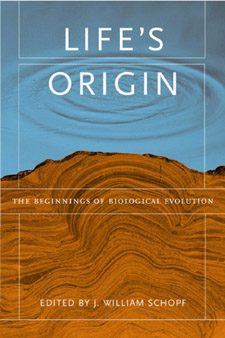 | Title: Life's origin: the beginnings of biological evolution Author: Schopf, J. William 1941- Published: University of California Press, 2002 Subjects: Organismal Biology | Paleontology | Astronomy | Evolution | Earth Sciences | Physical Sciences Publisher's Description: Always a controversial and compelling topic, the origin of life on Earth was considered taboo as an area of inquiry for science as recently as the 1950s. Since then, however, scientists working in this area have made remarkable progress, and an overall picture of how life emerged is coming more clearly into focus. We now know, for example, that the story of life's origin begins not on Earth, but in the interiors of distant stars. This book brings a summary of current research and ideas on life's origin to a wide audience. The contributors, all of whom received the Oparin/Urey Gold Medal of the International Society for the Study of the Origin of Life, are luminaries in the fields of chemistry, paleobiology, and astrobiology, and in these chapters they discuss their life's work: understanding the what, when, and how of the early evolution of life on Earth. Presented in nontechnical language and including a useful glossary of scientific terms, Life's Origin gives a state-of-the-art encapsulation of the fascinating work now being done by scientists as they begin to characterize life as a natural outcome of the evolution of cosmic matter. [brief] Similar Items |
| 10. | 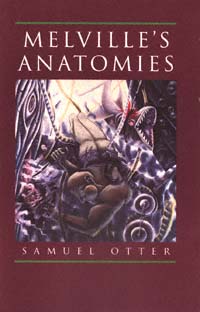 | Title: Melville's anatomies Author: Otter, Samuel 1956- Published: University of California Press, 1999 Subjects: American Studies | American Literature | United States History Publisher's Description: In fascinating new contextual readings of four of Herman Melville's novels - Typee , White-Jacket, Moby-Dick , and Pierre - Samuel Otter delves into Melville's exorbitant prose to show how he anatomizes ideology, making it palpable and strange. Otter portrays Melville as deeply concerned with issues of race, the body, gender, sentiment, and national identity. He articulates a range of contemporary texts (narratives of travelers, seamen, and slaves; racial and aesthetic treatises; fiction; poetry; and essays) in order to flesh out Melville's discursive world.Otter presents Melville's works as "inside narratives" offering material analyses of consciousness. Chapters center on the tattooed faces in Typee , the flogged bodies in White-Jacket , the scrutinized heads in Moby-Dick , and the desiring eyes and eloquent, constricted hearts of Pierre . Otter shows how Melville's books tell of the epic quest to know the secrets of the human body. Rather than dismiss contemporary beliefs about race, self, and nation, Melville inhabits them, acknowledging their appeal and examining their sway.Meticulously researched and brilliantly argued, this groundbreaking study links Melville's words to his world and presses the relations between discourse and ideology. It will deeply influence all future studies of Melville and his work. [brief] Similar Items |
| 11. | 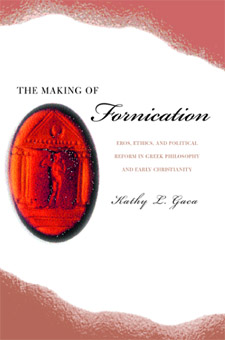 | Title: The making of fornication: eros, ethics, and political reform in Greek philosophy and early Christianity Author: Gaca, Kathy L Published: University of California Press, 2003 Subjects: Classics | Classical Philosophy | Classical Religions | Classical Politics | Christianity | Ethics | Social and Political Thought | Ancient History | Intellectual History Publisher's Description: This provocative work provides a radical reassessment of the emergence and nature of Christian sexual morality, the dominant moral paradigm in Western society since late antiquity. While many scholars, including Michel Foucault, have found the basis of early Christian sexual restrictions in Greek ethics and political philosophy, Kathy L. Gaca demonstrates on compelling new grounds that it is misguided to regard Greek ethics and political theory - with their proposed reforms of eroticism, the family, and civic order - as the foundation of Christian sexual austerity. Rather, in this thoroughly informed and wide-ranging study, Gaca shows that early Christian goals to eradicate fornication were derived from the sexual rules and poetic norms of the Septuagint, or Greek Bible, and that early Christian writers adapted these rules and norms in ways that reveal fascinating insights into the distinctive and largely non-philosophical character of Christian sexual morality. Writing with an authoritative command of both Greek philosophy and early Christian writings, Gaca investigates Plato, the Stoics, the Pythagoreans, Philo of Alexandria, the apostle Paul, and the patristic Christians Clement of Alexandria, Tatian, and Epiphanes, freshly elucidating their ideas on sexual reform with precision, depth, and originality. Early Christian writers, she demonstrates, transformed all that they borrowed from Greek ethics and political philosophy to launch innovative programs against fornication that were inimical to Greek cultural mores, popular and philosophical alike. The Septuagint's mandate to worship the Lord alone among all gods led to a Christian program to revolutionize Gentile sexual practices, only for early Christians to find this virtually impossible to carry out without going to extremes of sexual renunciation. Knowledgeable and wide-ranging, this work of intellectual history and ethics cogently demonstrates why early Christian sexual restrictions took such repressive ascetic forms, and casts sobering light on what Christian sexual morality has meant for religious pluralism in Western culture, especially among women as its bearers. [brief] Similar Items |
| 12. | 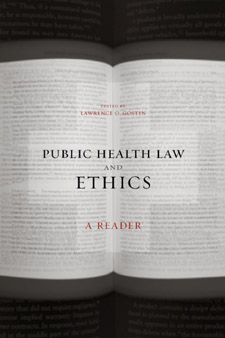 | Title: Public health law and ethics: a reader Author: Gostin, Larry O. (Larry Ogalthorpe) Published: University of California Press, 2002 Subjects: Law | Medicine | Health Care Publisher's Description: This incisive selection of government reports, scholarly articles, and court cases is designed to illuminate the ethical, legal, and political issues in the theory and practice of public health. A companion to the internationally acclaimed Public Health Law: Power, Duty, Restraint, this collection encourages debate and discourse about how courts, scholars, and policy makers respond to the salient legal and ethical dilemmas. The excerpts and commentaries in the reader analyze the legal and constitutional foundations of public health, juxtaposing them with the emerging importance of public health ethics and human rights. The book offers a systematic account of public health law, ethics, and human rights in promoting the common good. Gostin provides thoughtful commentary on the field of public health and carefully explains the meaning and importance of each selection. Scholars, legislators, and public health professionals, as well as faculty and students in schools of law, public health, medicine, nursing, government, and health administration, will benefit from the contemporary case studies covering a wide range of topics from bioterrorism to public health genetics. [brief] Similar Items |
| 13. | 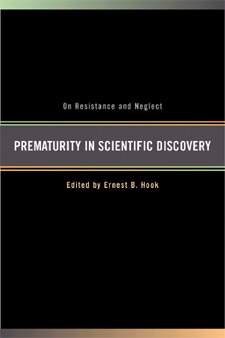 | Title: Prematurity in scientific discovery: on resistance and neglect Author: Hook, Ernest B 1936- Published: University of California Press, 2002 Subjects: Science | History of Science | Social and Political Thought | Geology | Evolution | Physics | History of Medicine Publisher's Description: For centuries, observers have noted the many obstacles to intellectual change in science. In a much-discussed paper published in Scientific American in 1972, molecular biologist Gunther Stent proposed an explicit criterion for one kind of obstacle to scientific discovery. He denoted a claim or hypothesis as "premature" if its implications cannot be connected to canonical knowledge by a simple series of logical steps. Further, Stent suggested that it was appropriate for the scientific community to ignore such hypotheses so that it would not be overwhelmed by vast numbers of false leads. In this volume, eminent scientists, physicians, historians, social scientists, and philosophers respond to Stent's thesis. [brief] Similar Items |
| 14. | 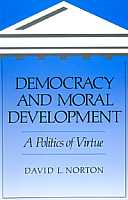 | Title: Democracy and moral development Author: Norton, David L Published: University of California Press, 1990 Subjects: Philosophy | Political Theory | Ethics Publisher's Description: At a time when politics and virtue seem less compatible than oil and water, Democracy and Moral Development shows how to bring the two together. Philosopher David Norton applies classical concepts of virtue to the premises of modern democracy. The centerpiece of the book is a model of organizational . . . [more] Similar Items |
| 15. | 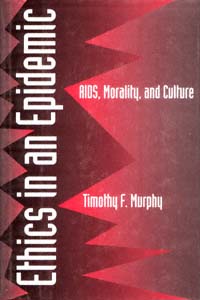 | Title: Ethics in an epidemic: AIDS, morality, and culture Author: Murphy, Timothy F 1955- Published: University of California Press, 1994 Subjects: Philosophy | Sociology | Ethics | Medicine | Social Problems Publisher's Description: AIDS strikes most heavily at those already marginalized by conventional society. With no immediate prospect of vaccination or cure, how can liberty, dignity, and reasoned hope be preserved in the shadow of an epidemic? In this humane and graceful book, philosopher Timothy Murphy offers insight into our attempts - popular and academic, American and non-American, scientific and political - to make moral sense of pain.Murphy addresses the complex moral questions raised by AIDS for health-care workers, politicians, policy makers, and even people with AIDS themselves. He ranges widely, analyzing contrasting visions of the origin and the future of the epidemic, the moral and political functions of obituaries, the uncertain value of celebrity involvement in anti-AIDS education, the functional uses of AIDS in the discourse of presidential campaigns, the exclusionary function of HIV testing for immigrants, the priority given to AIDS on the national health agenda, and the hypnotic publicity given to "innocent" victims.Murphy's discussions of the many social and political confusions about AIDS are unified by his attempt to articulate the moral assumptions framing our interpretations of the epidemic. By understanding those assumptions, we will be in a better position to resist self-serving and invidious moralizing, reckless political response, and social censure of the sick and the dying. [brief] Similar Items |
| 16. |  | Title: Reconfiguring modernity: concepts of nature in Japanese political ideology Author: Thomas, Julia Adeney 1958- Published: University of California Press, 2002 Subjects: History | Japan | Intellectual History | Asian History Publisher's Description: Julia Adeney Thomas turns the concept of nature into a powerful analytical lens through which to view Japanese modernity, bringing the study of both Japanese history and political modernity to a new level of clarity. She shows that nature necessarily functions as a political concept and that changing ideas of nature's political authority were central during Japan's transformation from a semifeudal world to an industrializing colonial empire. In political documents from the nineteenth to the early twentieth century, nature was redefined, moving from the universal, spatial concept of the Tokugawa period, through temporal, social Darwinian ideas of inevitable progress and competitive struggle, to a celebration of Japan as a nation uniquely in harmony with nature. The so-called traditional "Japanese love of nature" masks modern state power. Thomas's theoretically sophisticated study rejects the supposition that modernity is the ideological antithesis of nature, overcoming the determinism of the physical environment through technology and liberating denatured subjects from the chains of biology and tradition. In making "nature" available as a critical term for political analysis, this book yields new insights into prewar Japan's failure to achieve liberal democracy, as well as an alternative means of understanding modernity and the position of non-Western nations within it. [brief] Similar Items |
| 17. |  | Title: Urban revolt: ethnic politics in the nineteenth-century Chicago labor movement Author: Hirsch, Eric L 1952- Published: University of California Press, 1990 Subjects: History | United States History | Urban Studies Publisher's Description: Urban Revolt is a careful, incisive reexamination of the most highly mobilized urban revolutionary force in American history - the late nineteenth-century Chicago labor movement. By documenting the importance of ethnic origins in accounting for political choice, Eric L. Hirsch completely reconceptualizes the dynamics of urban social movements.Hirsch links the industrialization of Chicago to the development and maintenance of an ethnically segmented labor market. Urbanization, he argues, fostered ethnic enclaves whose inhabitants were channeled into particular kinds of jobs and excluded from others. Hirsch then demonstrates the political implications of emergent ethnic identities and communities.In the late nineteenth century, Chicagoans of German background - denied economic power by Anglo-Americans' control of craft unions and excluded from political influence by Irish-dominated political machines - formulated radical critiques of the status quo and devised innovative political strategies. In contrast, the Irish revolutionary movement in Chicago targeted the oppressive British political system; Irish activists saw no reason to overthrow a Chicago polity that brought them political and economic upward mobility. Urban Revolt gives a new perspective on revolutionary mobilization by de-emphasizing the importance of class consciousness, social disorganization, and bureaucracy. In his original and provocative focus on the importance of ethnicity in accounting for political choice, Hirsch makes a valuable contribution to the study of social movements, race, and working-class politics. [brief] Similar Items |
| 18. | 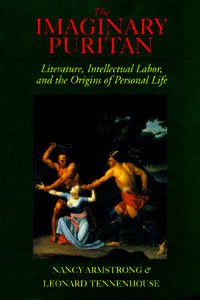 | Title: The imaginary puritan: literature, intellectual labor, and the origins of personal life Author: Armstrong, Nancy Published: University of California Press, 1992 Subjects: Literature | Literary Theory and Criticism | American Literature Publisher's Description: Nancy Armstrong and Leonard Tennenhouse challenge traditional accounts of the origins of modern Anglo-American culture by focusing on the emergence of print culture in England and the North American colonies. They postulate a modern middle class that consisted of authors and intellectuals who literally wrote a new culture into being.Milton's Paradise Lost marks the emergence of this new literacy. The authors show how Milton helped transform English culture into one of self-enclosed families made up of self-enclosed individuals. However, the authors point out that the popularity of Paradise Lost was matched by that of the Indian captivity narratives that flowed into England from the American colonies. Mary Rowlandson's account of her forcible separation from the culture of her origins stresses the ordinary person's ability to regain those lost origins, provided she remains truly English. In a colonial version of the Miltonic paradigm, Rowlandson sought to return to a family of individuals much like the one in Milton's depiction of the fallen world.Thus the origin both of modern English culture and of the English novel are located in North America. American captivity narratives formulated the ideal of personal life that would be reproduced in the communities depicted by Defoe, Richardson, and later domestic fiction. [brief] Similar Items |
| 19. | 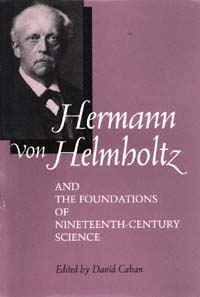 | Title: Hermann von Helmholtz and the foundations of nineteenth-century science Author: Cahan, David Published: University of California Press, 1994 Subjects: Science | History | History and Philosophy of Science | Victorian History Publisher's Description: Hermann von Helmholtz (1821-1894) was a polymath of dazzling intellectual range and energy. Renowned for his co-discovery of the second law of thermodynamics and his invention of the ophthalmoscope, Helmholtz also made many other contributions to physiology, physical theory, philosophy of science and mathematics, and aesthetic thought. During the late nineteenth century, Helmholtz was revered as a scientist-sage - much like Albert Einstein in this century.David Cahan has assembled an outstanding group of European and North American historians of science and philosophy for this intellectual biography of Helmholtz, the first ever to critically assess both his published and unpublished writings. It represents a significant contribution not only to Helmholtz scholarship but also to the history of nineteenth-century science and philosophy in general. [brief] Similar Items |
| 20. | 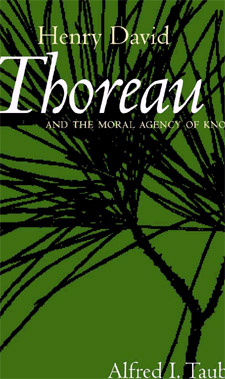 | Title: Henry David Thoreau and the moral agency of knowing Author: Tauber, Alfred I Published: University of California Press, 2001 Subjects: Philosophy | Literature | History and Philosophy of Science | Ethics Publisher's Description: In his graceful philosophical account, Alfred I. Tauber shows why Thoreau still seems so relevant today - more relevant in many respects than he seemed to his contemporaries. Although Thoreau has been skillfully and thoroughly examined as a writer, naturalist, mystic, historian, social thinker, Transcendentalist, and lifelong student, we may find in Tauber's portrait of Thoreau the moralist a characterization that binds all these aspects of his career together. Thoreau was caught at a critical turn in the history of science, between the ebb of Romanticism and the rising tide of positivism. He responded to the challenges posed by the new ideal of objectivity not by rejecting the scientific worldview, but by humanizing it for himself. Tauber portrays Thoreau as a man whose moral vision guided his life's work. Each of Thoreau's projects reflected a self-proclaimed "metaphysical ethics," an articulated program of self-discovery and self-knowing. By writing, by combining precision with poetry in his naturalist pursuits and simplicity with mystical fervor in his daily activity, Thoreau sought to live a life of virtue - one he would characterize as marked by deliberate choice. This unique vision of human agency and responsibility will still seem fresh and contemporary to readers at the start of the twenty-first century. [brief] Similar Items |